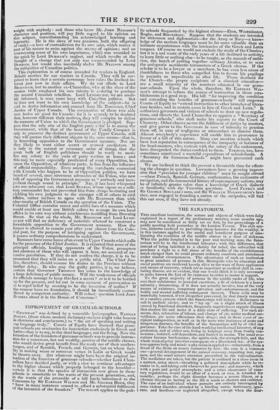IMPROVEMENT OF GRAMMAR-SCHOOLS.
" GnammAn" was defined by a venerable lexicographer, NATHAN BAILEY, (from whom modern dictionary-makers might take lessons Iii clearness and conciseness) as " the art of speaking and writing nay language truly." Courts of Equity have decreed that gram- mar-schools are seminaries for instruction exclusively in Greek and Latin—that is to say, in the dead languages, not the living. Now the intention of the founders of grammar-schools was to provide instruc- tion for a numerous, but not wealthy, portion of' the middle classes, who would derive great benefit from the ready use of their mother- tongue, and of Spanish, French, and German, but on whom in making sense or nonsense verses in Latin or Greek would be thrown away. But whatever might have been the original in- tention of the thunders of grammar-schools—whether Lord Chan- cellors have decided justly, or with a view to continue advantages to the higher classes which properly belonged to the humbler— certain it is that the species of instruction now given in those schools is unsuitable to the wants of the present generation, and, In the words of the preamble of a bill lately introduced to the Commons by Sir EARDLEY WILMOT and Mr. GEORGE HOPE, they "have in many instances ceased to afford a substantial fulfilment of the intention of the founders." The remark applies to the pub- lic schools frequented by the highest classes—Eton, Westminster, Rugby, and Shrewsbury. Suppose that the students are intended for statesmen and diplomatists—for the Army or Navy—a know- ledge of the modern languages must be far more valuable than an intimate acquaintance with the intricacies of the Greek and Latin tongues. Of course we would not exclude the study of the Classics; but it is a sad waste of the early years of a life destined to activity, to learn little or nothing else—to be taught, as the summit of ambi- tion, the knack of putting together ordinary Alcaics, or to scan the antispastic acatalectic tetrameters of a Greek chorus. If the scholar is to be a lawyer or a merchant, he has even less cause of thankfulness to those who compelled him to devote his pupilage in pursuits so unprofitable in after life. Those destined for the Church—the proper recipients of a classical education— arc a small minority of the numbers educated in our gram- mar-schools. Upon the whole, therefore, Sir EARDLEY WM.* MOT'S attempt to reform the course of instruction in those esta- blishments is a good step. His bill "for improving the condition and extending the benefits of grammar-schools" will empower Courts of Equity to "extend instruction to other branches of litera- ture besides, and in certain cases in lieu of, Greek and Latin." It authorizes governors and visitors of schools to draw up new regula- tions, and directs the Lord Chancellor to appoint a " Secretary of grammar-schools," who shall make his reports to the Court of Chancery. Other clauses secure the fulfilment of duties by masters, and give power to the Governors in case of infirmity to pension them off, in case of negligence or misconduct to dismiss them. Almost everybody's experience will enable him to pronounce in favour of a bill of this nature. Many can mention schools which have lost reputation in consequence of the incapacity or laziness of the head-masters, who, content with the salary of the endowment, have disregarded the duties confided to them. Trustees, too, have sometimes sanctioned a wasteful expenditure of school-funds. A "Secretary for Grammar-Schools " might have prevented such abuses.
We are inclined to think the present a favourable time for effect- ing the changes in question. Lawmakers have a growing impres- sion that "provision for younger children" must he sought abroad —where French, Spanish, German, mathematics, the rudiments of navigation, and the commercial history of contemporary nations, may be of infinitely greater value than a knowledge of Greek dialects or familiarity with the Tusculan questions. Lord PETRE's and Sir GEORGE SINCLAIR'S SODS, and Sir WILLIAM 'Ai OLESWORTH'S bro- ther, now engaged in founding a nation at the antipodes, will find this out soon, it' they have not already.


























 Previous page
Previous page